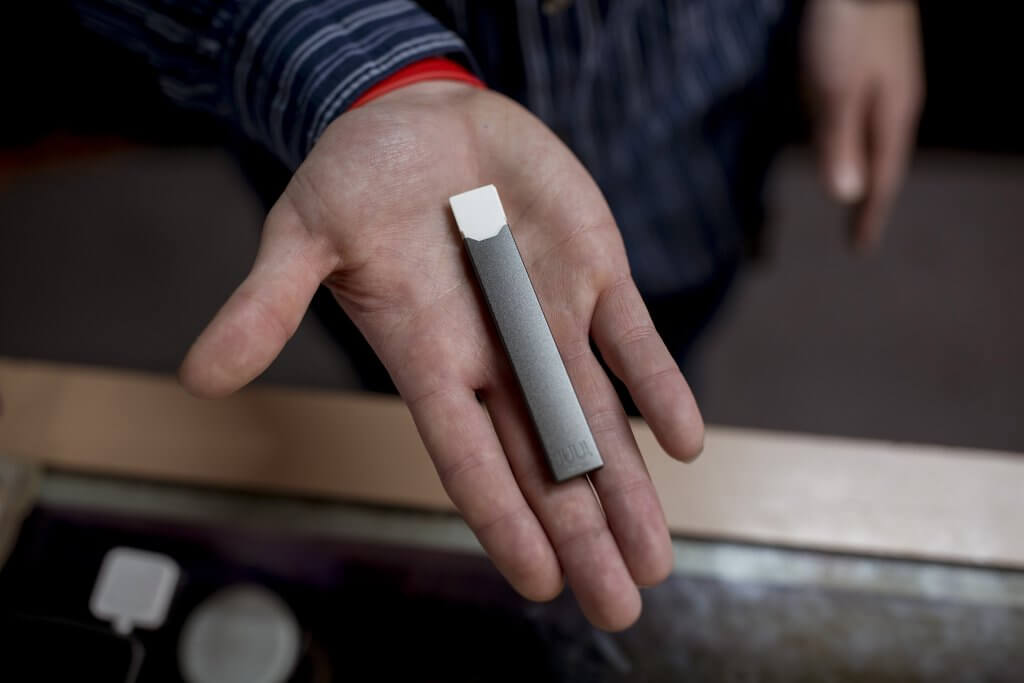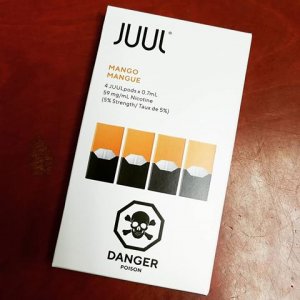After the government said that it was worried about the effect of products from the popular E-cigarette company JUUL on young users who become addicted to nicotine, rather than using the device to quit smoking, the company is attempting to show that they are taking the necessary steps to ensure the product is safe and sold into the right hands.
Read More I went on my own little journey to a deli in lower Manhattan to see whether they would need identification to buy a JUUL. Not only did the cashier card me, he also said that he cards everyone no matter what. He didn’t think he’d encountered any “hidden shoppers.” He also said that the fruity JUUL flavors, which the FDA has deemed a hazard because they attract younger kids who otherwise would not have been addicted to nicotine, haven’t yet been completely taken off the market in New York City, but they will be soon.
I went on my own little journey to a deli in lower Manhattan to see whether they would need identification to buy a JUUL. Not only did the cashier card me, he also said that he cards everyone no matter what. He didn’t think he’d encountered any “hidden shoppers.” He also said that the fruity JUUL flavors, which the FDA has deemed a hazard because they attract younger kids who otherwise would not have been addicted to nicotine, haven’t yet been completely taken off the market in New York City, but they will be soon.RELATED: The FDA Wants To Make It Harder For Kids To Get E-Cigarettes Are They Doing Enough?
The warning labels on the packaging are definitely clear. This writer bought a “fruit” flavored package of JUUL pods, along with the regular “tobacco” flavored pack that comes with the actual JUUL stick. The packaging of the stick itself has a large label that reads “WARNING: this product contains nicotine. Nicotine is an addictive chemical,” while the package of pods has a label with a skull and cross bones image, reading “DANGER,” and underneath that in smaller letters, “POISON.”
The discussion about how to handle the increase in E-cigarette sales to kids intensified when the Food And Drug Administration issued a proposal saying that companies would have to submit E-cigarette products for review by August 8, 2021, instead of by 2022. The FDA also says the government will be able to step in at any time to:
(1) Limit online vendors from selling without without a "heightened age verification process."
(2) Limit sales in brick-and-mortar vendors without age restrictions.
(3)Limit sale of products specifically aimed at young people.

The proposal was designed to address a big increase in kids smoking E-cigarettes. "The most recent data show more than 3.6 million middle and high school students across the country were current (past 30 day) E-cigarette users in 2018," Scott Gottlieb, commissioner of the FDA, said in a statement at the time. "This is a dramatic increase of 1.5 million children since the previous year. The data also showed that youth who used E-cigarettes also were using them more frequently and they were using flavored E-cigarette products more often than in 2017. This is particularly troubling given that research shows that kids using E-cigarettes are more likely to take up combustible cigarettes."
There was also some pressure for the company to stop selling fruity flavors, which are enticing to kids. But because JUUL products actually do help some people quit smoking, there was a debate over whether banning fruity flavors altogether was the best option.
"The reluctance to ban the flavors completely is interesting, and I think it's something worthy noting," said Dr. Donna Shelley, Professor in the Department of Population Health and Department of Medicine at NYU Langone Health at the time. "[Gottlieb] was really trying to walk this line between reducing the appeal to kids, and using these to help adults quit. And a lot of the adults who are trying to quit tobacco say they like the flavors. Are we going to try and maintain some of that type of product for that particular population? People were calling for the ban of flavors, but [the FDA is] really trying hard to walk that line."
According to Dr. Shelley, the biggest reason kids vape is misinformation. Kids understand cigarettes are bad for them, so they don't smoke. "Kids are really under the misconception that this is just a cool thing to do the same way we were with cigarettes fifty years ago. Back then nobody thought cigarettes were going to be dangerous," she says. "But if [the FDA] continues on the path, kids are smart, we are hoping kids will see these ads."
What worked best with cigarettes was a campaign about telling the truth, according to Dr. Shelley. "It worked for cigarettes because it was really a truth campaign. That's what was so successful 'this industry is manipulating you.' 'Real cost' is very much about the truth, just like the truth campaign which was remarkably successful. We have a lot of information about product regulation and counter advertising."

But it's a difficult process, and a lot of steps that were taken for cigarettes have yet to be implemented for E-cigarettes. "For cigarettes we have a ban on any advertising having cartoon characters, advertising directed specifically toward kids. They haven't banned that yet [for E-cigarettes], but I think we're moving toward that," she said.
And now, the tobacco industry could be getting involved with E-cigarettes. "We're playing catch up with this product, and I think the most concerning thing is that the tobacco industry is getting into this business. Altria just invested $12 million in JUUL. They know how to get kids addicted to nicotine. JUUL was definitely advertising to kids. It really escalated the problem because of the brilliant design and the ad campaigns." Altria is the manufacturer that makes Marlboro and Virginia Slims.
For JUUL smokers who do hope to move away from the stick, quitting the JUUL is no easy task. A recent study at Rutgers University showed that about 10 million American adults and 3.6 million teenagers are currently using e-cigarettes but more than 60 percent of those users want to quit. However, of the 1,771 people surveyed in the study, only about a quarter of users actually tried quitting.
Information about vaping and cancer
The general consensus about vaping is that it’s a safer alternative to smoking cigarettes … but can we know that for sure? The biggest issue with vaping and Juul is that doctors aren’t really sure what the long-term effects will be. Dr. Brendon Stiles, a thoracic surgeon at Weill Cornell Medical Center, said that studies on these effects need to be done now — especially since so many young people are taking up vaping.
Dr. Brendan Stiles, thoracic surgeon at Weill Cornell Medical Center, on vaping and cancer
“If we wait 10 to 15 years until we see the clinical effects on all these kids who have taken up vaping, it’s going to be too late,” Dr. Stiles said. “What effect do these compounds have on lung health? On lung inflammation on young people? On old people? On previous smokers?”
Dr. Stiles pointed out that there was just a landmark study that showed the death rate from cancer has fallen to the lowest point in 25 years — and there are people who are worried that vaping may cause that number to go back up. “There’s plenty of history of other inflammatory lung conditions causing or triggering lung cancer, so for me it’s not a great leap to think that inhalation from vaping can trigger lung cancer down the road or other inflammatory lung diseases,” Dr. Stiles said.
Learn more about SurvivorNet's rigorous medical review process.

